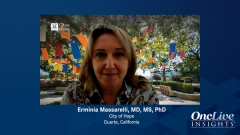
NSCLC: Mobocertinib for Patients With EGFR Exon 20 Insertion Mutations
Considerations for the FDA approval and practical use of mobocertinib in patients with EGFR exon 20 insertion mutations in NSCLC.
Episodes in this series

Transcript:
Erminia Massarelli, MD, MS, PhD: The mechanism of action of mobocertinib [Exkivity] is an irreversible EGFR tyrosine kinase inhibitor. However, it differs from osimertinib [Tagrisso], which is currently approved for exon 19 and21 mutations. There is a significant overlap between the exon 20 insertion mutation wild type defined by the ATP [adenosine triphosphate] binding pocket. But this renders osimertinib not very effective in the binding of the pocket for the activity of this compound and it’s against the EGFR exon 20 insertion mutation. The amino acid insertion in the exon 20 is located at the C –helix or the P-loop [phosphate-binding loop] of the EGFR kinases and pushes the C-helix into a permanent active confirmation that is distant from the ATP binding site.
Mobocertinib was designed in selectivity by targeting proteins in the vicinity of the alpha C-helix, a binding site not exploded by osimertinib. More specifically, osimertinib was not able to bind the exon 20 insertion mutations and mobocertinib is able to bind this pocket that is created in the confirmation of this mutated EGFR.
The data that led to the accelerated approval of mobocertinib was presented at ASCO [American Society of Clinical Oncology] 2021 by Dr [INAUDIBLE]. The data was from 2 different cohorts. One was with platinum-pretreated patients’, which included 100 first time patients. The other one was the original phase 1 cohort that included 96 patients from the EXCLAIM safety cohort.
The data cutoff was in November 2020. The median age of the 115 patients within the platinum-pretreated patients cohort was 60 years old—it was 66% female, 60% Asian, and 59% had at least 2 or more prior systemic anticancer treatments. The objective response rate by the independent investigative review committee was 28%. It included 1 complete response in which the rate was 78%, and the median duration of response was 17.5 months.
The EXCLAIM cohort included 96 patients with a median age of 59 years. The cohort was 65% female, 69% Asian, and 49% had at least 2 or more prior lines of therapy. The confirmed objective response rate was 25% with 1 complete response. The disease rate was 76% and the median duration of response was not reached at the time of analysis. In EXCLAIM, the baseline brain metastasis was present in 33 out of 96 patients, so 34%. The first site of disease progression was in the brain among 40% of all patients and 73% of patients had a baseline with brain metastasis. The confirmed responses were seen in both groups, in the platinum previously treated patients, and the EXCLAIM cohort. The treatment-related adverse events in the platinum-pretreated cohort were 91% of patients had diarrhea, 45% had a rash, and 38% experienced paronychia. There was also decreased appetite, nausea, dry skin, and vomiting. The grade 3 or higher incidents which led to discontinuation, were about 2% diarrhea and 4% nausea. The most important and frequent toxicity for mobocertinib was diarrhea.
Mobocertinib was FDA [Food and Drug Administration] approved in September for patients with EGFR exon 20 insertion mutations after progression of platinum based first-line therapy. These patients are in the metastatic incurable setting. This patient population already had the recent approval of amivantamab [Rybrevant]. Mobocertinib offers these patients another treatment. Current clinical trials are testing both drugs, amivantamab and mobocertinib in mutations not treated before, for metastatic incurable non-small cell lung cancer. The clinical trials are especially testing mobocertinib because it is an oral EGFR tyrosine kinase inhibitor. Mobocertinib is a significant option that could increase survival for these patients that [they] otherwise did not have until a few months ago.
Transcript edited for clarity.






































